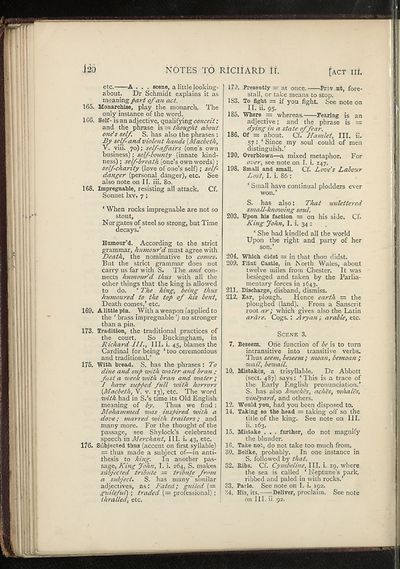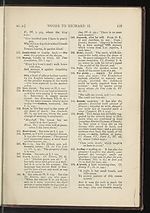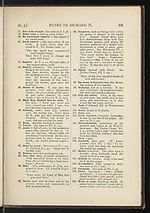Download files
Complete book:
Individual page:
Thumbnail gallery: Grid view | List view

i20
[act ni.
NOTES TO RICHARD II.
etc. A . . . scene, a little looking-
about. Dr Schmidt explains it as
meaning part of an act.
165. Monarchise, play the monarch. The
only instance of the word.
1G6. Self- is an adjective, qualifying conceit;
and the phrase is = thought about
one's self. S. has also the phrases :
By self- and violent hands [Macbeth,
V. viii. 70); self-affairs^ (one’s own
business) ; self-bounty (innate kind¬
ness) ; self-breath (one’s own words);
self-charity (love of one’s self); self
danger (personal danger), etc. See
also note on II. iii. 80.
168. Impregnable, resisting all attack. Cf.
Sonnet Ixv. 7 :
* When rocks impregnable are not so
stout.
Nor gates of steel so strong, but Time
decays.’
Humour’d. According to the strict
grammar, humour'd must agree with
Death, the nominative to comes.
But the strict grammar does not
carry us far with S. The and con¬
nects humour'd thus with all the
other things that the king is allowed
to do. 4 The king, being thus
humoured to the top of his bent.
Death comes,* etc.
169. A little pin. With a weapon (applied to
the 4 brass impregnable ’) no stronger
than a pin.
173. Tradition, the traditional practices of
the court. So Buckingham, in
Richard III., III. i. 45, blames the
Cardinal for being ‘ too ceremonious
and traditional.’
175. With bread. S. has the phrases : To
dine and suf with zvater and bran ;
fast a week with bran and zvater;
I have supped full zvith horrors
[Macbeth, V. v. 13), etc. The word
with had in S.’s time its Old English
meaning of by. Thus we find:
Mohammed was inspired with a
dove: marred zvith traitors; and
many more. For the thought of the
passage, see Shylock’s celebrated
speech in Merchant, III. i. 43, etc.
176. Subjected thus (accent on first syllable)
= thus made a subject of—in anti¬
thesis to king. In another pas¬
sage, King John, I. i. 264, S. makes
subjected tribute = tribute from
a subject, S. has many similar
adjectives, as: Fated; guiled (=
guileful) ; traded (= professional) ;
thralled, etc.
179. Presently — at once. Pr’v.nt, fore¬
stall, or take means to stop.
1S3. To fight = if you fight See note on
II. ii. 95.
185. Where == whereas. Fearing is an
adjective; and the phrase is =
dying in a state of fear.
186. Of = about. Cf. Hamlet, III. ii.
57: ‘Since my soul could of men
distinguish.’
190. Overblown—a mixed metaphor. For
over, see note on I. i. 147.
198. Small and small. Cf. Love's Labour
Lost, I. i. 86 :
‘ Small have continual plodders ever
won.’
S. has also: That unlettered
small-knowing soul.
203. Upon his faction = on his side. Cf.
King John, I. i. 34 :
‘ She had kindled all the world
Upon the right and party of her
son.’
204. Which didst = in that thou didst.
209. Flint Castle, in North Wales, about
twelve miles from Chester. It was
besieged and taken by the Parlia¬
mentary forces in 1643.
211. Discharge, disband, dismiss.
212. Ear, plough. Hence earth — the
ploughed (land). From a Sanscrit
root ar; which gives also the Latin
ardre. Cogs.: Aryan; arable, etc.
Scene 3.
7. Beseem. One function of be is to turn
intransitive into transitive verbs.
Thus seem, beseem ; moan, bemoan ;
wail, bewail.
10. Mistakes, a trisyllable. . Dr Abbott
(sect. 487) says: ‘ This is a trace of
the Early English pronunciation.’
S. has also knockcs, aches, zvhales,
vineyard, and others.
12. Would you, had you been disposed to.
14. Taking so the head = taking off so the
title of the king. See note on III.
ii. 163.
15. Mistake . . . further, do not magnify
the blunder.
16. Take not, do not take too much from.
30. Belike, probably. In one instance in
S. followed by that.
32. Ribs. Cf. Cymbeline, III. i. 19, where
the sea is called ‘ Neptune’s park,
ribbed and paled in with rocks.’
33. Parle. See note on I. i. ip2.
34. His, its. Deliver, proclaim. See note
on III. ii 92.
[act ni.
NOTES TO RICHARD II.
etc. A . . . scene, a little looking-
about. Dr Schmidt explains it as
meaning part of an act.
165. Monarchise, play the monarch. The
only instance of the word.
1G6. Self- is an adjective, qualifying conceit;
and the phrase is = thought about
one's self. S. has also the phrases :
By self- and violent hands [Macbeth,
V. viii. 70); self-affairs^ (one’s own
business) ; self-bounty (innate kind¬
ness) ; self-breath (one’s own words);
self-charity (love of one’s self); self
danger (personal danger), etc. See
also note on II. iii. 80.
168. Impregnable, resisting all attack. Cf.
Sonnet Ixv. 7 :
* When rocks impregnable are not so
stout.
Nor gates of steel so strong, but Time
decays.’
Humour’d. According to the strict
grammar, humour'd must agree with
Death, the nominative to comes.
But the strict grammar does not
carry us far with S. The and con¬
nects humour'd thus with all the
other things that the king is allowed
to do. 4 The king, being thus
humoured to the top of his bent.
Death comes,* etc.
169. A little pin. With a weapon (applied to
the 4 brass impregnable ’) no stronger
than a pin.
173. Tradition, the traditional practices of
the court. So Buckingham, in
Richard III., III. i. 45, blames the
Cardinal for being ‘ too ceremonious
and traditional.’
175. With bread. S. has the phrases : To
dine and suf with zvater and bran ;
fast a week with bran and zvater;
I have supped full zvith horrors
[Macbeth, V. v. 13), etc. The word
with had in S.’s time its Old English
meaning of by. Thus we find:
Mohammed was inspired with a
dove: marred zvith traitors; and
many more. For the thought of the
passage, see Shylock’s celebrated
speech in Merchant, III. i. 43, etc.
176. Subjected thus (accent on first syllable)
= thus made a subject of—in anti¬
thesis to king. In another pas¬
sage, King John, I. i. 264, S. makes
subjected tribute = tribute from
a subject, S. has many similar
adjectives, as: Fated; guiled (=
guileful) ; traded (= professional) ;
thralled, etc.
179. Presently — at once. Pr’v.nt, fore¬
stall, or take means to stop.
1S3. To fight = if you fight See note on
II. ii. 95.
185. Where == whereas. Fearing is an
adjective; and the phrase is =
dying in a state of fear.
186. Of = about. Cf. Hamlet, III. ii.
57: ‘Since my soul could of men
distinguish.’
190. Overblown—a mixed metaphor. For
over, see note on I. i. 147.
198. Small and small. Cf. Love's Labour
Lost, I. i. 86 :
‘ Small have continual plodders ever
won.’
S. has also: That unlettered
small-knowing soul.
203. Upon his faction = on his side. Cf.
King John, I. i. 34 :
‘ She had kindled all the world
Upon the right and party of her
son.’
204. Which didst = in that thou didst.
209. Flint Castle, in North Wales, about
twelve miles from Chester. It was
besieged and taken by the Parlia¬
mentary forces in 1643.
211. Discharge, disband, dismiss.
212. Ear, plough. Hence earth — the
ploughed (land). From a Sanscrit
root ar; which gives also the Latin
ardre. Cogs.: Aryan; arable, etc.
Scene 3.
7. Beseem. One function of be is to turn
intransitive into transitive verbs.
Thus seem, beseem ; moan, bemoan ;
wail, bewail.
10. Mistakes, a trisyllable. . Dr Abbott
(sect. 487) says: ‘ This is a trace of
the Early English pronunciation.’
S. has also knockcs, aches, zvhales,
vineyard, and others.
12. Would you, had you been disposed to.
14. Taking so the head = taking off so the
title of the king. See note on III.
ii. 163.
15. Mistake . . . further, do not magnify
the blunder.
16. Take not, do not take too much from.
30. Belike, probably. In one instance in
S. followed by that.
32. Ribs. Cf. Cymbeline, III. i. 19, where
the sea is called ‘ Neptune’s park,
ribbed and paled in with rocks.’
33. Parle. See note on I. i. ip2.
34. His, its. Deliver, proclaim. See note
on III. ii 92.
Set display mode to:
![]() Universal Viewer |
Universal Viewer | ![]() Mirador |
Large image | Transcription
Mirador |
Large image | Transcription
| Antiquarian books of Scotland > Languages & literature > Shakespeare's Richard II > (122) |
|---|
| Permanent URL | https://digital.nls.uk/109386334 |
|---|
| Description | Thousands of printed books from the Antiquarian Books of Scotland collection which dates from 1641 to the 1980s. The collection consists of 14,800 books which were published in Scotland or have a Scottish connection, e.g. through the author, printer or owner. Subjects covered include sport, education, diseases, adventure, occupations, Jacobites, politics and religion. Among the 29 languages represented are English, Gaelic, Italian, French, Russian and Swedish. |
|---|

